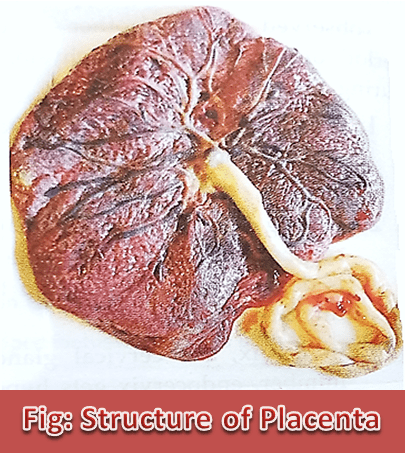Placenta:
The intimate connection established between the fetal membrane and uterine wall of the mother is known as the placenta.
Structure of Placenta:
The placenta provides oxygen and nutrients to the growing foetus and removes waste products from the foetus’s blood. The placenta attaches to the wall of the uterus and the baby’s umbilical cord develops from the placenta. The umbilical cord is what actually connects the mother and the baby. Placentas are a defining characteristic of placental mammals. But are also found in some non-mammals with varying levels of development.

Function of Placenta:
The placenta performs the following functions:
1. Nutrition:
The nutritive elements from the material blood pass into the foetus through the placenta. The perfusion of the intervillous spaces of the placenta with maternal blood allows the transfer of nutrients and oxygen from the mother to the foetus and the transfer of waste products and carbon dioxide back from the foetus to the maternal blood supply. Nutrient transfer to the foetus occurs via both active and passive transport.
2. Respiration:
Oxygen passes from the maternal blood to the foetal blood through the placenta and carbon dioxide passes from the foetus to the maternal blood through the placenta.
3. Excretion:
The waste products excreted from the foetus such as urea, uric acid and creatinine are all transferred to the material blood by the process of diffusion across the placenta.
4. Immunity:
The placenta functions as selective material – a fetal barrier against the transmission of microbes. IgG-antibodies can pass through the human placenta, thereby providing protection to the foetus. This transfer of antibodies begins as early as the 20th week of gestation and certainly by the 24th week. However, insufficiency in this function may still cause mother-to-child transmission of infectious diseases.
5. Storage:
The placenta stores glycogen, fat, etc.
6. Endocrine Function:
During pregnancy, a woman’s hormones go through many significant changes. Hormones have a very important role in the human body, especially during pregnancy. Hormones help the body function and change by causing communication from organs to tissues throughout the body.
Hormones regulate the body physiologically and in other ways, including digestion, metabolism, respiration, tissue function, sensory perception, sleep, excretion, lactation, stress, growth and development, movement, reproduction and mood.
7. As a Barrier:
Placenta serves as an efficient barrier and allows those materials to pass into the foetal blood that is necessary. The placenta and foetus may be regarded as a foreign allograft inside the mother, and thus evade attack by the mother’s immune system.